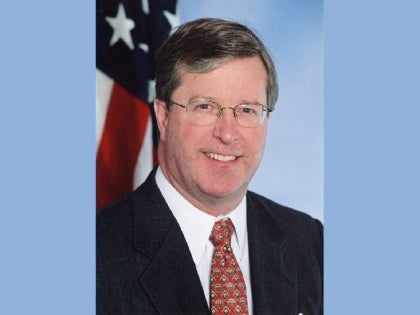
Winner: State Assembly Leaders Absent On Stronger Sex Offender Laws

Albany, N.Y.-- As communities across the Southern Tier consider the enactment of local laws to keep citizens better informed on the whereabouts of convicted sex offenders, as well as to better police these offenders, State Senator George H. Winner, Jr. (R-C, Elmira) today charged the Democratic leadership of the New York State Assembly with being "tragically negligent" for refusing to act on legislation already approved by the state Senate, with overwhelmingly bipartisan support, to revise and strengthen New York’s 10-year-old Sex Offender Registration Act, commonly known as "Megan’s Law."
Winner stressed that with just a few days remaining in this year’s regular session of the State Legislature, Assembly inaction has raised the specter that the Legislature will adjourn without any action being taken to reform Megan’s Law.
"How many times does Assembly Speaker Sheldon Silver have to read about a repeat sex offender violating another child before he decides that it’s time to act? The Assembly leadership’s refusal to act to reform Megan’s Law is fundamentally irresponsible government," said Winner, who co-sponsors the Senate’s comprehensive revision of Megan’s Law. "It’s outrageous, and it’s tragic."
Winner said that local officials supportive of more restrictive sex offender measures should also turn their attention to the state Capitol, where Assembly Democratic leaders have continually rebuffed efforts being made by Winner and his Senate colleagues to revise and strengthen New York’s sex offender registration laws.
Two weeks ago the Senate approved comprehensive legislation, known as the "Tenth Anniversary Sex Offender Registration Reform Act," to ensure mandatory community notification so that citizens are better informed about the presence of sex offenders in their communities and to require all sex offenders to register for life. The measure was approved 56-2 and has drawn support from both sides of the political aisle.
Last week the Senate reapproved the separate components of the "Tenth Anniversary Sex Offender Registration Reform Act," piece by piece, in an effort to give the Assembly the opportunity, if it won’t act on the comprehensive measure, to at least consider single reform proposals, including legislation to restrict Level 3 sex offenders from residing within one-quarter mile of any school or licensed day care facility. Similar measures have already been enacted in some communities, including the city of Binghamton, and are under consideration by local officials throughout the Southern Tier and statewide.
"Our communities and our children need us to make Megan’s Law an even stronger protection against dangerous sex offenders," said Winner, noting that one criticism of the current law is that only the highest-level sex offenders are required to register for life. All other sex offenders must register for a period of 10 years, after which time they go "off the books" and are removed from the registry. That means that about 3,000 offenders will be dropped from the registry, which became effective in 1996, within the coming year.
In addition to requiring lifetime registration of all sex offenders, Senate-approved legislation would require mandatory community notification. Under current law, it is left up to the discretion of the police whether they notify community members about the presence of a sex offender. Under the Senate proposal, the following notification provisions would be applied:
> Level 1 offenders: Mandatory notification of law enforcement agencies where the crime was committed and, upon release, where the offender intends to reside;
> Level 2 offenders: Law enforcement agencies where the crime was committed and, upon release, where the offender intends to reside must be notified. In addition, police must disseminate information, including a photograph, to entities with vulnerable populations, such as schools. The information may be further disseminated;
> Level 3 offenders: The requirements for notification for Level 3 offenders are the same as Level 2 but in addition, law enforcement agencies must issue a news release to local media. They also may use their discretion to conduct other notification activities within the community, including public meetings and flyers.
Winner said that the legislation also requires the Division of Criminal Justice Services’ (DCJS) web site to post information about Level 1, 2 and 3 sex offenders. Currently, only information on Level 3 offenders is required online. In addition, visitors to the web site would be able to register for e-mail notification regarding sex offenders living in, or relocating to, their zip code. Specific provisions include:
> Level 1: The DCJS web site must provide a name, a dated photograph, and approximate address;
> Level 2: The web site must provide the same information as Level 1 offenders, plus additional material regarding the offender’s crime and type of victim;
> Level 3: The web site must provide a name, a dated photograph, place of employment, exact address, and other information relating to the offender and his or her criminal background.
The Senate measure would also require Level 3 offenders to wear a global positioning system (GPS) monitoring device for the duration of their registration. This device could immediately notify a county probation officer, for example, if a Level 3 offender enters a pre-programmed "exclusionary area," such as a day care center, playground or school. The legislation outlines numerous provisions relating to the type of GPS device the offender must wear, the offender’s required contribution to its cost, penalties for the removal or disabling of the tracking mechanism, and judicial authority to modify the equipment.
Winner stressed that recidivism rates for persons who commit sexually violent offenses are extraordinarily high. According to the New York State Department of Correctional Services, from 1986 through 1995, approximately 49 percent of sex offenders who were released from New York prisons were returned to prison for a violation of parole or for committing a new crime.
Earlier this year the Senate approved legislation, which Winner also co-sponsors, to keep sexually violent predators off the streets for longer periods of time through a process known as "civil confinement." Sixteen states currently have laws authorizing the civil confinement of sexually violent predators. The legislation Winner co-sponsors is modeled after a state of Kansas statute which has been upheld by the United States Supreme Court. It provides a comprehensive framework for identifying, evaluating and civilly committing sexually violent predators that extends the full complement of constitutional due process protections to those against whom sexually violent predator petitions are brought. It would establish a state-level panel to conduct evaluations, including psychiatric examinations, to determine whether a sex offender about to be released from prison is a "sexually violent predator" who should remain confined. Sexually violent predators are identified as sex offenders with mental abnormalities or personality disorders that make them likely to engage in repeated acts of sexual violence. Currently in New York State there is no statutory authority to civilly confine sexually violent predators to secure facilities, such as a mental health facility, after they serve their criminal sentences.
Megan's Law is named for 7-year-old Megan Kanka, a New Jersey girl who was raped and murdered in 1994 by a paroled sex offender who had moved into her neighborhood. Megan’s mother, Maureen, testified at a Senate hearing earlier this year, the first of three public hearings senators have held over the past month to gather testimony from law enforcement officials, teachers, parents and advocates on ways to strengthen Megan’s Law.
New York State's Sex Offender Registry was approved in 1995 and has been expanded several times over the past decade. It requires registration as a sex offender upon a conviction of a listed offense or a conviction for an attempt to commit a listed offense. There are currently 37 registerable offenses in New York State. The law has four distinct procedures for community notification. First, local law enforcement agencies are notified whenever a sex offender moves into their jurisdiction and may, in turn, notify the community as allowed by the Act. Additionally, state Division of Criminal Justice Services (DCJS) maintains official information on Level 3 sex offenders, the highest-risk offenders, on its web site. The division produces a Subdirectory of Level 3 Sex Offenders maintained by local police agencies. It also provides a Sex Offender Registry Information Line (1-800-262-3257).
There are currently 20,538 people listed on the state’s Sex Offender Registry. According to DCJS, as of April 2005, the following number of offenders were registered in area counties: Chemung (141); Schuyler (31); Steuben (192); Tompkins (87); and Yates (44).



